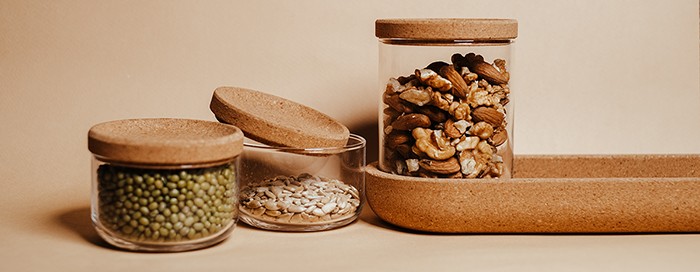An article by Birgit Kogler BSc, dietician:
https://www.ernaehrungsberatung-kogler.at/
BCAA for stronger muscles: What do they really do?
Anyone who does weight training, wants to build muscle or is generally interested in sports nutrition will have come across the abbreviation ‘BCAA’ several times. Hidden behind these letters are special amino acids. These are said to have positive effects on muscle growth and performance. BCAAs, from the English ‘Branched Chain Amino Acids’, are offered as supplements in capsule or powder form on the fitness market and make the cash registers ring. But what is behind them? Is it money-making or the recipe for success for rapid muscle building?
As already described in the previous blog post on the topic of ‘Protein requirements in sport’, the body’s own proteins are made up of 20 different amino acids. 8 of these are essential and must be supplied through food. 3 of these essential amino acids are summarised as branched-chain amino acids – BCAAs for short – due to their chemical structure:
| Leucin | Isoleucin | Valin |
Function, occurrence and requirement.
BCAAs are particularly important for the brain, for the body’s energy supply and for muscle function. Postulated effects are
- Improved muscle building
- Prevention of a negative protein balance (muscle breakdown)
- Improved energy supply
- Building block for glucose production (gluconeogenesis)
- Interest has been aroused in the sports sector primarily due to the positive effects on muscle maintenance and development. 35 per cent of muscle protein consists of these amino acids. As a result, many BCAA supplements are sold today that advertise with enticing promises. BCAAs are now among the best-selling sports supplements on the fitness market.
However, BCAAs occur naturally in many different foods, so that sufficient amounts can be taken in with a balanced, protein-adapted diet:
| Foods containing BCAAs |
| dairy products |
| meat and fish |
| nuts |
| pulses |
For example, 100 g of chicken breast provides approx. 4 g of BCAAs. Special BCAA supplements contain 250 to 600 mg per capsule, high-quality whey protein-based sports shakes provide 4 g of BCAAs per 20 g of protein. In order to take in the same amount of BCAAs, 7-16 capsules would have to be swallowed.
No precise figures can be given for the requirement of BCAAs as the scientific evidence is insufficient. Recommendations range from an estimated amount of 10 to 40 g per day to specific milligrammes per kilogramme of body weight.
BCAAs for muscle building.
Strength athletes in particular turn to BCAA supplements to stimulate muscle growth. In fact, BCAAs can activate anabolic metabolic processes and thus support muscle protein synthesis. Compared to other amino acids, BCAAs have the considerable advantage that, once ingested, they are channelled directly into the muscle cells and bypass the liver as the central metabolic organ.
This sounds tempting in theory, but in practice the results are different. Studies have shown a correlation between the intake of BCAAs and increased muscle protein synthesis, but the effect was significantly higher after the intake of a complete protein (especially whey protein). In other words: BCAAs alone are good, but intact proteins containing all essential amino acids are even better.
However, if you do not want to do without BCAAs, you should divide your intake into 4-6 portions of 3 g BCAAs each. Dosages over 10 g BCAAs per portion may cause nausea, flatulence or diarrhoea. Kidney and liver values should be checked regularly for long-term use.
BCAAs against muscle fatigue.
BCAAs are also often sold with the promise of ‘preventing muscle soreness and muscle damage’. To date, there is no scientific evidence for this claim. It is therefore often just a sales ploy.
Other postulated effects, such as supporting fat loss, reducing muscle loss or reducing fatigue by taking BCAAs, have also not been scientifically proven. High-quality proteins such as whey protein in dairy products or the targeted combination of several vegetable protein sources have a clear advantage for muscles and athletic performance due to the broader spectrum of amino acids.
Conclusion.
The intake of BCAA supplements is therefore superfluous in a balanced, needs-orientated sports diet. Instead, the focus should be on sufficient protein intake, good protein quality and the right protein timing.
Author: Birgit Kogler BSc, dietician: https://www.ernaehrungsberatung-kogler.at/
Sources:
Bundesinstitut für Riskobewertung. (2019). Nahrungsergänzungsmittel – Isolierte verzweigtkettige Aminosäuren können bei hoher Aufnahme die Gesundheit beeinträchtigen. Stellungnahme Nr. 052/2019 des BfR vom 20. Dezember 2019. Online im WWW unter: https://www.bfr.bund.de/cm/343/nahrungsergaenzungsmittel-isolierte-verzweigtkettige-aminosaeuren-koennen-bei-hoher-aufnahme-die-gesundheit-beeintraechtigen.pdf Letzter Zugriff am: 20.6.2022
Egger C. (k.J.) BCAAs im Sport und was sie wirklich bringen. Österreichische Gesellschaft für Sporternährung.
Fouré A, Bendahan D. (2017). Is Branched-Chain Amino Acids Supplementation an Efficient Nutritional Strategy to Alleviate Skeletal Muscle Damage? A Systematic Review. Nutrients. 2017;9(10):1047.
Graumann L, Walter UN, Krapf F (2019) Regeneration. Jeden Tag erholt, ausgeschlafen und erfolgreich. Riva Verlag, ein Imprint der Münchner Verlagsgruppe GmbH, München.
Lamprecht M, Holasek S, Konrad M et al. (2017). Lehrbuch der Sporternährung. Das wissenschaftlich fundierte Kompedium zur Ernährung im Sport. 1. Auflage. CLAX Fachverlag GmbH, Graz.





